|
Featured picture tools: |
These featured pictures, as scheduled below, appeared as the picture of the day (POTD) on the English Wikipedia's Main Page in July 2008. Individual sections for each day on this page can be linked to with the day number as the anchor name (e.g. [[Wikipedia:Picture of the day/July 2008#1]] for July 1).
You can add an automatically updating POTD template to your user page using {{Pic of the day}} (version with blurb) or {{POTD}} (version without blurb). For instructions on how to make custom POTD layouts, see Wikipedia:Picture of the day.Purge server cache
July 1
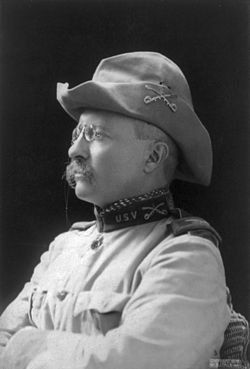
|
Colonel Theodore Roosevelt of the Rough Riders, a regiment of volunteers in the United States Army. Under Roosevelt's leadership, the Rough Riders became famous for dual charges up Kettle Hill and San Juan Hill on July 1, 1898. On leaving the Army, Roosevelt was elected governor of New York in 1898. He was then chosen to be William McKinley's vice-presidential running mate in the 1900 election. Roosevelt then succeeded to the presidency upon McKinley's assassination in 1901. Photo credit: B. J. Falk
Recently featured:
|
July 2
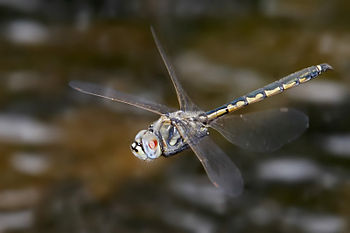
|
A Tau Emerald (Hemicordulia tau) dragonfly in flight over a creek. Insects are the only group of invertebrates to have evolved powered flight. Insects possess some remarkable flight characteristics and abilities, superior in many ways to anything created by mankind. Photo credit: Fir0002
Recently featured:
|
July 3
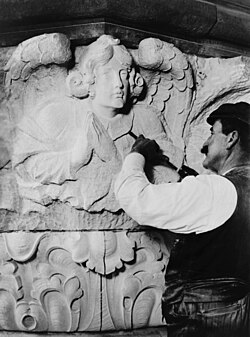
|
A stonemason at work in 1909, stonecutting an angel at the Cathedral of Saint John the Divine, New York. The craft of stonemasonry—creating buildings, structures, and sculpture using stone—has existed since the dawn of civilization. These materials have been used to construct many of the long-lasting, ancient monuments, artifacts, cathedrals, and cities in a wide variety of cultures. Some famous products of stonemasonry include the Taj Mahal, Easter Island's Moai statues, the Egyptian pyramids, Angkor Wat, Tihuanaco, Tenochtitlan, the Iranian Persepolis, the Greek Parthenon, Stonehenge, and Chartres Cathedral. Photo credit: Bain News Service
Recently featured:
|
July 4
|
A video of the second raising of the U.S. flag on Iwo Jima, the photograph of which by Joe Rosenthal became one of the most recognizable of World War II. This was shot by U.S. Marine Sergeant Bill Genaust, who was standing next to Rosenthal, and as such, the film shows the event from almost the same angle as the famous photograph. Film credit: Bill Genaust, United States Marine Corps
Recently featured:
|
July 5
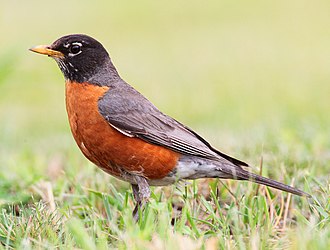
|
The American Robin (Turdus migratorius) is a migratory songbird of the thrush family. The similarity between the orange-red coloring of its breast to that of the smaller and unrelated European Robin (Erithacus rubecula) led to its common name. It is widely distributed throughout North America, wintering south of Canada from Florida to central Mexico and along the Pacific Coast. Photo credit: Mdf
Recently featured:
|
July 6

|
A pastoral scene of a lone house, composed using Blender, an open source 3D computer graphics software. Blender can be used for a number of applications and is available for a wide variety of operating systems. Image credit: Michael Otto
Recently featured:
|
July 7

|
A Bell 206 Jetranger helicopter of the Los Angeles Police Department (LAPD) showing clearly the searchlight, loudspeakers, antennas and other law enforcement modifications. Photo credit: Matthew Field
Recently featured:
|
July 8

|
Intercession of Charles Borromeo supported by the Virgin Mary, a fresco in the Karlskirche in Vienna, Austria. In 1713, a year after the bubonic plague epidemic, Charles VI, Holy Roman Emperor decided to build a church to honor his namesake patron saint, who was renowned as a healer for plague sufferers in his day. Artist: Johann Michael Rottmayr
Recently featured:
|
July 9

|
David Farragut was the first senior officer of the United States Navy during the American Civil War. He was the first rear admiral, vice admiral, and full admiral of the Navy. He is remembered in popular culture for his possibly apocryphal order at the Battle of Mobile Bay, usually paraphrased: "Damn the torpedoes, full speed ahead!" ("torpedo" was the contemporary term for what is now known as a naval mine). Photo credit: Mathew Brady or Levin Corbin Handy |
July 10

|
Hoverflies, or flower flies, are a family of about 5,000 species of Diptera, with hovering and darting flight. Most are nectar feeding and many mimic bees and wasps, with their characteristic black and yellow bands in the abdomen. This poster shows sixteen different species of hoverflies from southern Europe. Image credit: Joaquim Alves Gaspar |
July 11

|
Computed tomography (CT) of a human brain, from the base of the skull (top left) to the top, taken with an intravenous contrast agent. This medical imaging method employs tomography and digital geometry processing to generate a three-dimensional image of the inside of an object from a large series of two-dimensional x-ray images taken around a single axis of rotation. Image credit: Mikael Häggström |
July 12

|
An 1896 engraving of the interior of the New Synagogue, Berlin. The synagogue was noted for its Moorish style and resemblance to the Alhambra. During the Kristallnacht pogrom of 1938, the Synagogue was set ablaze. Today the synagogue serves as an exhibit for various aspects of the Holocaust, particularly Kristallnacht. Image credit: Wilhelm Ernst & Sohn
Recently featured:
|
July 13

|
The Chandos portrait is a famous painting believed to depict William Shakespeare, and is named after James Brydges, 1st Duke of Chandos, who owned the portrait. It has not been possible to solve the question of who painted the portrait or whether it really depicts Shakespeare. However, in 2006 the National Portrait Gallery in London concluded that the Chandos portrait was the most likely to be a representation of Shakespeare. Artist: Attributed to John Taylor
Recently featured:
|
July 14

|
Lower Consolation Lake, adjacent to Moraine Lake in Banff National Park, Alberta, Canada. Located in the Canadian Rockies, Banff National Park is the oldest national park in Canada and one of the most visited national parks in the world. Photo credit: Chuck Szmurlo
Recently featured:
|
July 15

|
Beer Street and Gin Lane are a pair of 1751 engravings by William Hogarth in support of the then-proposed Gin Act 1751. This Act of Parliament made the distillation of gin illegal in England. Beer Street shows a happy city drinking the "good" beverage of English beer, whereas Gin Lane claims to show what would happen if people started drinking gin, a harder liquor. People are shown as healthy, happy and hardworking in Beer Street, while in Gin Lane they are scrawny, lazy and acting carelessly, including a drunk mother accidentally sending her baby tumbling to its doom. Image credit: William Hogarth
Recently featured:
|
July 16

|
A portrait of American writer Samuel Clemens, best known by his pen name Mark Twain, in his later years. Twain is most noted for his novels Adventures of Huckleberry Finn, which has since been called the Great American Novel, and The Adventures of Tom Sawyer. Twain enjoyed immense public popularity, and his keen wit and incisive satire earned him praise from both critics and peers. Fellow author William Faulkner called Twain "the father of American literature". Photo credit: Unknown
Recently featured:
|
July 17

|
The Japanese Squirrel (Sciurus lis) is a species of rodent in the Sciuridae family. It is endemic to Japan. Photo credit: Ma2bara
Recently featured:
|
July 18

|
A view of Hurricane Felix from the International Space Station. At the time of the photo, Felix was south of Kingston, Jamaica with winds of 165 mph (266 km/h) with higher gusts making it a category 5 on the Saffir-Simpson Hurricane Scale. One hundred and thirty fatalities were directly associated with this storm. Photo credit: Expedition 15 astronaut (NASA)
Recently featured:
|
July 19
|
The Red Postman (Heliconius erato) is a butterfly found throughout northern South America. This species has many different colour morphs, and other species, particularly the Postman, mimic it, often making it difficult to accurately identify. H. erato is one of the few butterflies that collects and digests pollen, conferring considerable longevity (several months) to the adults. Photo credit: Richard Bartz
Recently featured:
|
July 20
|
A film of the 1940 collapse of Galloping Gertie, the first Tacoma Narrows Bridge in Tacoma, Washington, United States. The bridge opened on July 1, 1940 and from the start became notorious for its movement during windy days, earning the nickname "Galloping Gertie". The wind-induced collapse occurred on November 7, 1940, due partially to a physical phenomenon known as aeroelastic flutter. Film credit: Barney Elliott
Recently featured:
|
July 21

|
A welder making boilers for a ship for the Combustion Engineering Co., Chattanooga, Tennessee, in 1942. This welder is shown with a welding helmet, gloves, and other protective clothing. Photo credit: Alfred T. Palmer
Recently featured:
|
July 22

|
A photochrom of an elderly Irish woman using a spinning wheel, a device for spinning thread or yarn from natural or man-made fibers. Manual spinning wheels were likely invented in the 13th century, replacing the earlier spindle and distaff, and remained in use until automated mass production techniques were invented in the Industrial Revolution. Hand-spinning remains a popular handicraft. Photo credit: Detroit Publishing Co.
Recently featured:
|
July 23
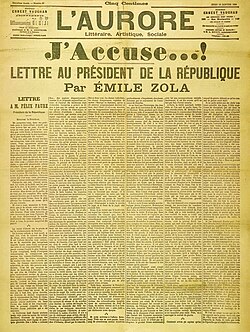
|
Émile Zola's famous public letter "J'accuse" to the President of France Félix Faure in protest against the mishandling of the Dreyfus Affair, January 13, 1898. The letter accused the government of anti-Semitism and the unlawful jailing of Alfred Dreyfus, a French General Staff officer sentenced for espionage to penal servitude for life. Zola pointed out judicial errors and lack of serious evidence. The letter was printed on the first page of the newspaper L'Aurore and caused a stir in France and abroad. For publishing this letter, Zola was prosecuted and found guilty of libel and he avoided punishment by fleeing to England. As a result of the popularity of the letter, even in the English-speaking world, J'accuse! has become a common generic expression of outrage and accusation against a powerful person. Author: Émile Zola
Recently featured:
|
July 24

|
A 1917 recruitment poster for women to join the United States Navy. In March 1917, Secretary of the Navy Josephus Daniels realized that the Naval Reserve Act of 1916 used the word "yeoman" instead of "man" or "male", and allowed for the induction of "all persons who may be capable of performing special useful service for coastal defense." He began enlisting females as Yeoman (F), and in less than a month the Navy officially swore in Loretta Perfectus Walsh, the first female sailor in U.S. history. At the time they were popularly referred to as "yeomanettes" or even "yeowomen". Artist: Howard Chandler Christy
Recently featured:
|
July 25

|
Two Welcome Swallow (Hirundo neoxena) chicks, one day after fledging. The Welcome Swallow is a small passerine bird in the swallow family native to Australia and nearby islands, but not until recently to New Zealand. It is very similar to the Pacific Swallow. Photo credit: Benjamint444
Recently featured:
|
July 26
| File unavailable |
|
A panorama of the Bibliothèque nationale de France (the French national library) in Paris, as seen from the right bank of the Seine. The Simone-de-Beauvoir pedestrian bridge is visible on the left, the Bercy bridge, on the right. Photo credit: Benh Lieu Song
Recently featured:
|
July 27

|
Ground troop movements during the Gulf War (called "Operation Desert Storm" by the U.S. military) from February 24–28, 1991. Coalition forces invaded Kuwait and Iraq to defeat and expel Iraqi forces. Map credit: Jeff Dahl |
July 28

|
A Red Admiral butterfly (Vanessa atalanta) collecting nectar from a Blue Gem flower (Hebe × franciscana). This species is found in temperate Europe, Asia and North America. This large butterfly is identified by its dark brown, red and black wing pattern. Photo credit: Joaquim Alves Gaspar
Recently featured:
|
July 29

|
Malcolm X was an American Black Muslim minister and a spokesman for the Nation of Islam. Born Malcolm Little, he changed his surname to "X" as a rejection of his "slave name". Tensions between him and the Nation of Islam caused him to break from the group in 1964. He claimed to have received daily death threats and his house was burned to the ground in February 1965. One week later, Malcolm X was assassinated, having been shot in the chest by a sawed-off shotgun and 16 times with handguns. Three members of the Nation of Islam were convicted. Photo credit: Ed Ford, New York World-Telegram and Sun
Recently featured:
|
July 30
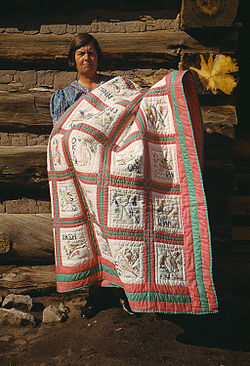
|
Mrs. Bill Stagg of Pie Town, New Mexico with her embroidered patchwork quilt that displays all 48 (at the time) United States state flowers and birds, October 1940. Quilting was a very popular early American pastime, particularly in the Midwest, where quilting circles were a common social pastime for women. Annual town fairs generally included a quilting bee, to award excellence in quilting. Handmade quilts were a very common wedding gift for young couples, and were often mentioned specifically in wills due to their sentimental significance. Photo credit: Russell Lee, Farm Security Administration
Recently featured:
|
July 31

|
A bee feeding on a twisted pair of yellow coneflowers (Echinacea paradoxa). Photo credit: Derek Ramsey
Recently featured:
|
Picture of the day archives and future dates